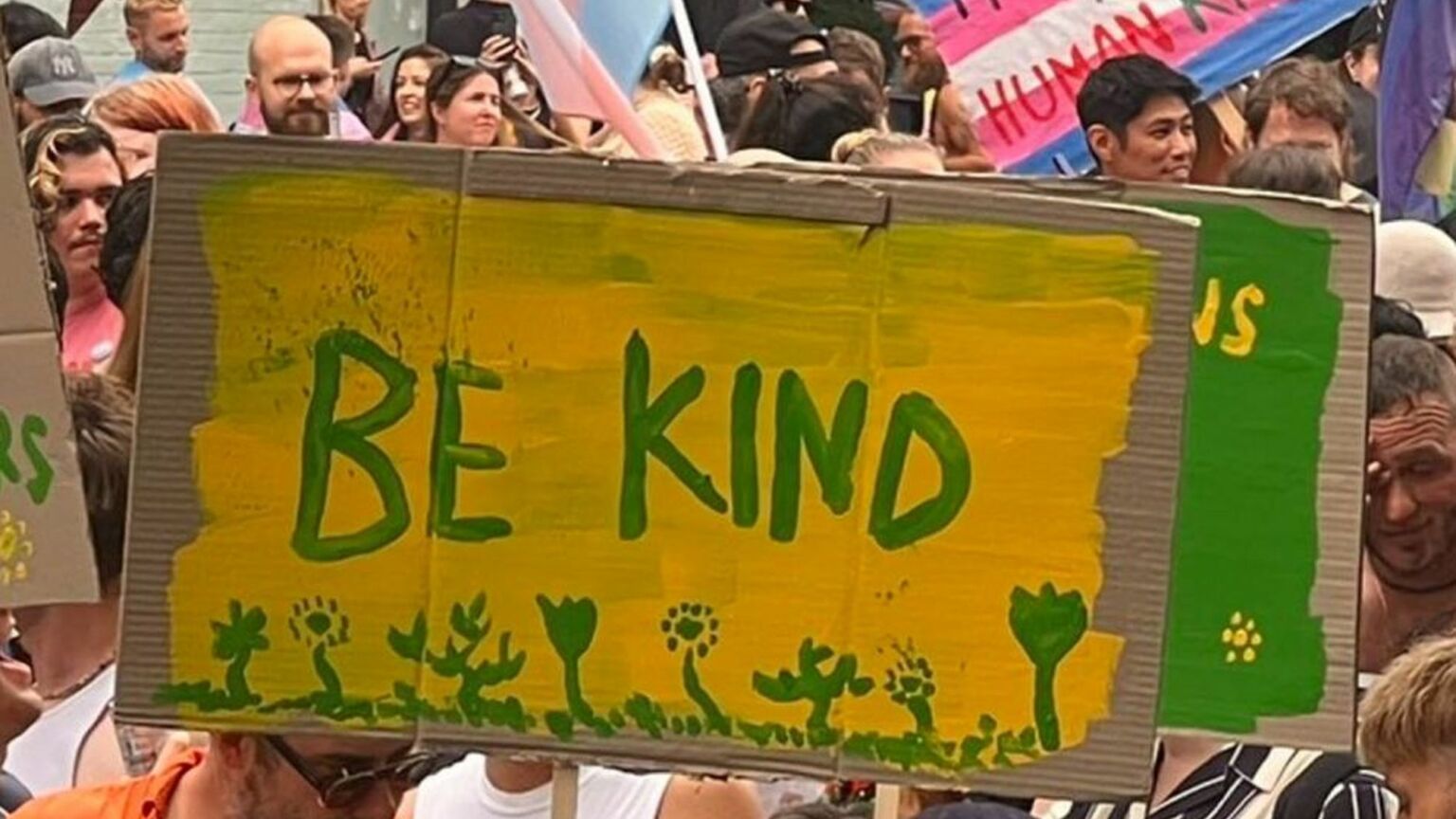Why the ‘be kind’ era is bad for women
Trans activists are weaponising ‘kindness’ to strip us of our rights.

Want to read spiked ad-free? Become a spiked supporter.
Brighton’s local paper, the Argus, carries the glad tidings that a local ‘garden centre is to host a half-term event for children’. This will be ‘a free kindness workshop’ for ‘youngsters aged four to 10’. Apparently, it will focus on ’teaching children how to be kind and why this is important’. Children will also learn ‘how to look after themselves by eating healthily and talking about their feelings’. So basically, one long lesson in how to be a drip, rather than encouraging the outward-bound toughness we tried to instil in children back in the 20th century. After all, it’s not as if the mental health of youngsters has got any worse from being over-protected, is it?
Interestingly, the photograph alongside this irresistible offer features only females – an adult and two children. It’s conceivable that the staff at Dobbies are all female, and that explains the woman. But why are the two children both girls? Don’t boys need to focus on how kindness is important, too?
We may no longer accept the old saw, ‘boys will be boys’, as an excuse for everything from arson to zoophilia. But the icky trend for ‘be kind’ clothing is aimed squarely at one sex. As the social commentator, Laura Bishop, tells me: ‘While shopping for my kids I noticed that there are so many items of clothing which say “be kind”. They are all in the girls’ and women’s section. Every. Single. One. It’s like indoctrination.’
Note to clothing manufacturers and retailers – it’s not girls who need reminding to be kind, judging from the violent crime statistics. Although, of course, the massive imbalance recorded between the sexes is becoming ever narrower, due to the insane practice of recording cross-dressing male sex offenders as ‘she’.
Enforced kindness started out as a conditioning process for female children. Until recently, it was quite rightly rejected by any fun-loving woman with a soupçon of self-respect. But it has now become a shaming mechanism to be used against adult human females who refuse to toe the line. Everything from single-sex toilets to sporting trophies must be sacrificed on the ‘be kind’ bonfire. In this era of gender ideology, women are called upon to give up our rights and our spaces so as to appease men who think they are women.
I grew up in a society which required women to ‘be kind’ and to flatter men. Then came a brief moment of honesty, and now the kindly lies have started up again. But even if all this wasn’t insulting and inhibiting to women, there also comes a point when ‘affirming’ so-called transwomen is cruel. You see these men all over social media, with faces that only a blind mother could love, posing in basques and gymslips. Lying in the name of kindness may be a way to avoid hurting people’s feelings – ‘No, your bulge doesn’t look big in those skin-tight ski-pants’ – but it does men who claim they are women no good at all in the long-run.
This deceitful cheerleading is led by a group of women I call the Transmaids, often to be found in the Labour Party. (The way things are going, it’s entirely likely that the first ‘woman’ to lead the People’s Party will have a penis.) Emily Thornberry and other leading Labourites have admitted their stance on trans issues is influenced by them having trans-identified relatives. But as a Mumsnet maverick put it: ‘Wanting to be kind and protect a trans cousin or spouse or child or friend is natural, but is not a good enough reason to reorder society, change the literal meaning of words and remove sex segregation where that matters.’ The Labour Transmaids insist we must deny basic biology or risk causing supposedly unimaginable suffering. Apparently, every time someone says they don’t believe transwomen are women, somewhere a transvestite’s tights split.
The moral vacuity and vanity of the Transmaids ought to be laughable. But their strange and strong conviction is now harming actual women. These truly are luxury beliefs. It’s highly unlikely that the likes of Thornberry, Stella Creasy and Lisa Nandy will ever need a women’s refuge, or go to jail. They certainly won’t suddenly become little girls again, trying to navigate a strange world where their physical safety comes second to their male classmates’ ‘feelings’.
Just take the recent case of the four-year-old boy who was allowed to join a Church of England school as a girl. The Telegraph reported that ‘the child’s sex was hidden from classmates, who were described by parents as traumatised when they found out’. The parents of one child who was friends with the transgender child said that their daughter has struggled to come to terms with learning her friend is not a girl and that teachers ‘lied’ to her about it. Another said the trans-identifying child had been ‘flashing [his] willy’ at classmates in the school toilets. I’d call this child abuse – but I’m sure the usual geek chorus believe that the girls simply being kind would solve everything.
Why is it that girls are expected to make all the effort? Surely the fact that male transvestites don’t feel comfortable using their sex-assigned toilets is a reason to teach boys to be kind – not to inflict yet more emotional housework on girls.
Now comes a new survey by the Crown Prosecution Service, which appears to suggest that there has been a ‘stark regression’ of attitudes among young men regarding rape over the past decade. It reveals that more than two-thirds of 18- to 24-year-olds believe you cannot withdraw consent in-person after agreeing to have sex with someone online. Nearly half believe that it’s not rape if a victim doesn’t fight back. And more than half don’t believe rape can be committed in an existing sexual relationship. Rape (effectively ‘decriminalised’, according to Dame Vera Baird) and domestic murders (two a week, of women by men) continue to be two of this country’s most thriving areas of endeavour.
Is ‘be kind’ really the advice we want to give girls growing up in such a world? Might not ‘be tough’ be better?
Julie Burchill’s new play, Making Marilyn, co-authored with Daniel Raven, will be at Brighton Palace Pier in May. Get tickets here.
Picture by: X.
Who funds spiked? You do
We are funded by you. And in this era of cancel culture and advertiser boycotts, we rely on your donations more than ever. Seventy per cent of our revenue comes from our readers’ donations – the vast majority giving just £5 per month. If you make a regular donation – of £5 a month or £50 a year – you can become a and enjoy:
–Ad-free reading
–Exclusive events
–Access to our comments section
It’s the best way to keep spiked going – and growing. Thank you!











Comments
Want to join the conversation?
Only spiked supporters and patrons, who donate regularly to us, can comment on our articles.